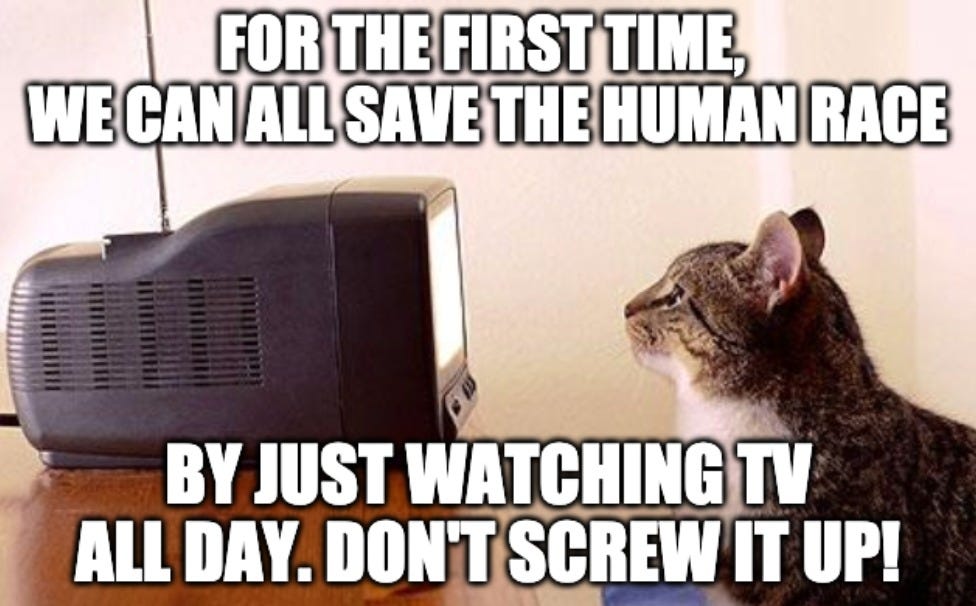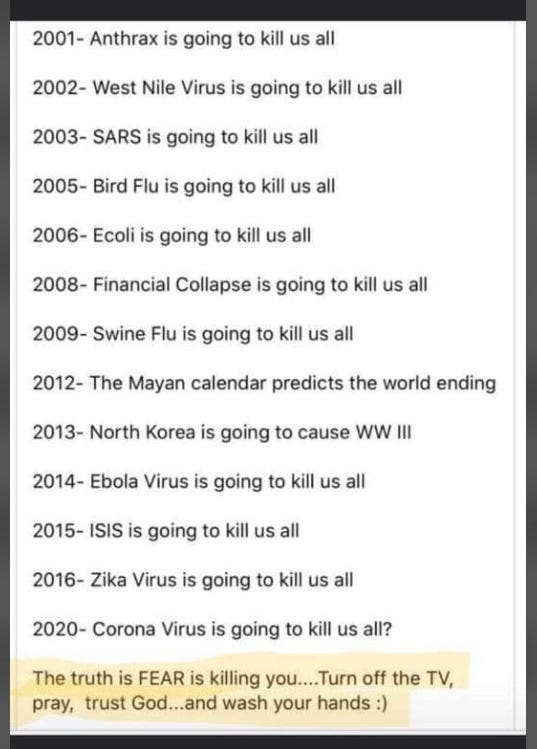
This edition was produced with Zach Peterson (@zachprague)
Welcome back! For now, I’ll save the “Yes, my newsletter is back and I’m excited” post for a later, less turbulent time. But yes, The Sunday Note is back, we’re on Substack, and it feels great.
For the foreseeable future, I’m hosting free COVID-19 calls every day on FB, Twitter, LinkedIn & YouTube (more on that below), and I’d love for you to join us, no matter where you are. I talk to doctors, journalists, and really anyone who has insight to share on the pandemic and its overwhelming effects on all aspects of society. It’s a truly global emergency right now, and we all need to do what we can to keep people talking, learning, and healthy. Subscribe to my YouTube channel, and get in the conversation - we’d love to have you.
Anyway… global pandemics, news literacy, and social media...
Most of us are working from home now, except for the frontline, including healthcare workers, grocery store clerks, delivery teams, pharmacists and some other professions. We’re also teaching at home, cooking at home, cleaning at home, constantly staying at home, pacing around our homes, and so much more. The news is moving as fast as it ever has and - for me - the last few weeks have felt more like months. And, my screen time, like yours I’m sure, is off the charts.
All that screen time inevitably means seeing a lot of misinformation, unsourced (or dubiously-sourced) claims, and irresponsible commentary. None of these things are new to digital and social media, but now they are costing lives in near-real time. There are myriad examples - of differing severity - but I want to share one that was making the rounds on Facebook over the last couple of pre-crisis weeks:

Content like this is dangerous, and most reasonable people will disregard it, scroll past, roll their eyes, and simply move on. But it’s memes like this that sow doubt, uncertainty, and pollute the information space. Plus, it’s simply wrong - nearly everything on this list was met with decisive government/international action. There *are* good memes out there - I put one right at the top of this piece!
The same is true for all of those “notes from a doctor or nurse in <affected country/region>” that profess some expertise or advice in dealing with COVID-19. Many of them may in fact be real, but I implore you to either resist sharing them, or at least do your due diligence to confirm the source. Perhaps you received it from a trusted friend or other source, but it takes a few minutes to confirm these accounts, and you’re performing a crucial public service if you do it.
Put bluntly - do not share unverified accounts of events, information about public rules or policy, anything about household “cures” for COVID19, or anything else you find even remotely fishy or otherwise untrustworthy.
Every day, people are inundated with disinformation from, of all places, the White House briefing room and the president’s Twitter feed. I urge you to do your part, listen to the true experts, read and share responsibly, and support everyone you can.
I’ll leave you with this, a true sign of the times - NBA star Steph Curry’s incredibly informative discussion with Dr. Anthony Fauci. America’s foremost authority figure on the COVID-19 pandemic needs to go around the White House to get real, reliable information to the public.
With that, I welcome you back to our little Sunday meetings. Stay safe, do everything you possibly can to prevent the spread of the COVID-19 virus, and, if you need help, ask for it.
Maps You Can Use
Every day brings new data on the COVID-19 spread and impact, and there no shortage of people - both inside and outside the health care sector - doing great things to make this all a bit more digestible for all of us. Here are some excellent visual resources - tweet @ me - @sree - with your go-to COVID-19 information source.
🦠 Coronavirus.app - Notion [link]

🥼 Johns Hopkins University Coronavirus Resource Center [link]
🏥 Covid Visualizer - Carnegie Mellon students Navid Mamoon & Gabriel Rasskin [link]
Watch Something
Working from home, kids out of school, unable to visit friends and family - these are the staples of our lives for the foreseeable future. Every day, I host a free, open-to-the-public COVID19 call with guests from all over the world and all walks of life. Medical experts, psychologists, everyday people adjusting as you are, and even the occasional “celebrity” (loosely-defined!). Tune in on any platform, join us, and find a new community! Here’s an episode from earlier this week, with Nelufar Hedayat (@nelufar), host of the “Course Correction” podcast from Doha Debates, and Marco Greenberg (@marcogreenberg), author of "Primitive: Tapping the Primal Drive That Powers the World's Most Successful People". It had 180,000+ viewers.
Listen to Something
The Lawfare Podcast is regularly worth your time, but their discussion with Dr. Rebecca Katz (@RebeccaKatz5), Director of the Center for Global Health Science and Security at Georgetown, is a must-listen. It’s a bit in the weeds as to how governments interact and deal with health scares at a macro level, and I found it very helpful. COVID-19 isn’t the first, and certainly isn’t the last, global pandemic. Take an hour and learn something about how it all works. Listen here, or on all major podcast platforms.
Odds & Ends
🗞 My Sunday #NYTReadalong, executive produced by Neil Parekh (@neilparekh): Every Sunday I read the print edition of the NYT live. This week, our guests are a doctor, Dr. Sujana Chandrasekhar and two 13-year olds, Diego Gonzalez and Samuel Bachman. The teens will tell us about how they are coping with the COVID-19 lockdown, their experiences with virtual learning, their take on the news, and their podcast(!), The Half Blood Report. Watch live on Sunday at 8:30am ET / 12:30pm GMT / 6pm IST, or catch the recorded version later.
The Sunday #NYTReadalong is sponsored by Muck Rack, Strategy Focused Group, and TweetsMap.
🎧 NEW! Every Saturday, I host a call-in show on WBAI 99.5 (@wbai) - "Coping with Covid19" - focused on being helpful, hopeful, and focusing on the pandemic's effects on society’s most vulnerable - workers, the poor, the marginalized - and talk to ordinary citizens & experts on how we can emerge stronger.
Listen live from 12-2pm EST, or later. And, of course, call in and tweet questions for us using the #wbaisree hashtag!
👀 Did we miss anything? Make a mistake? Do you have an idea for anything we’re up to? Let us know!




